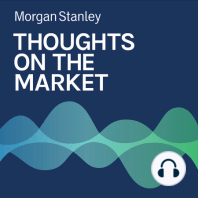3 min listen

Michael Zezas: The Impact of Tariff Relief
Michael Zezas: The Impact of Tariff Relief
ratings:
Length:
3 minutes
Released:
Jul 6, 2022
Format:
Podcast episode
Description
As media reports indicate a possible tariff reduction on imports from China, some investors are wondering if this is signaling a return of modest trade barriers and unfettered investment between the U.S. and China.-----Transcript-----Welcome to Thoughts on the Market. I'm Michael Zezas, Head of Public Policy Research and Municipal Strategy for Morgan Stanley. Along with my colleagues, bringing you a variety of perspectives, I'll be talking about the intersection between U.S. public policy and financial markets. It's Wednesday, July 6th, at 1 p.m. in New York. If media reports citing White House sources are to be believed, the U.S. is getting closer to reducing some tariffs on imports from China, motivated at least in part by trying to ease inflation pressures. This has prompted some investors to ask us if we think this is a signal that the U.S./China economic relationship is starting to head back toward what it was before 2018, where trade barriers between the two countries were modest, and U.S. corporate investment in China was largely unfettered. In short, we do not think this is the case and rather expect that the U.S. and China will continue on its current path of drawing up more barriers to commerce between them, particularly in the areas of new and emerging technologies. Let's break it down. Consider that the scope of the tariff reductions being reported is quite small. One report, citing a Biden administration official, suggested tariffs could be reduced on about $10 billion worth of goods, a sliver of the $370 billion of goods currently under tariff. Given that taking away all the tariffs would only result in shaving a few tenths of a percent off consumer price index growth, this modest change, though reportedly intended to curb inflation, is unlikely to be a meaningful inflation fighter. That suggests the U.S. continues to prioritize its long term competition goals with China over inflation concerns, which is not surprising given continued skepticism among U.S. voters of both parties over the role of China in the global economy. This leads to another important point, that tariff relief could counterintuitively accelerate U.S. policies that create commerce barriers with China. In line with our expectations, media reports suggest a tariff relief announcement could be paired with news of a fresh Section 301 investigation, which is the process to kick off a new round of tariffs that could be imposed on China. Again, this makes sense when accounting for the long term policy goals of the U.S., as well as the political considerations in a midterm election year. So bottom line, don't read too much into tariff relief if it's announced. The U.S. and China are likely to continue drawing up barriers, and accordingly rewiring the global economy as companies shift supply chains and end market strategies. This is 'slowbalization' in motion, and it will continue to drive challenges, such as margin pressure for U.S. multinationals, and opportunities, such as for key sectors like semiconductor capital equipment companies benefiting from a new wave of geopolitical CapEx. Thanks for listening. If you enjoy the show, please share Thoughts on the Market with a friend or colleague, or leave us a review on Apple Podcasts. It helps more people find the show.
Released:
Jul 6, 2022
Format:
Podcast episode
Titles in the series (100)
Mike Wilson: 3 Summer Surprises Investors Could Be Missing by Thoughts on the Market